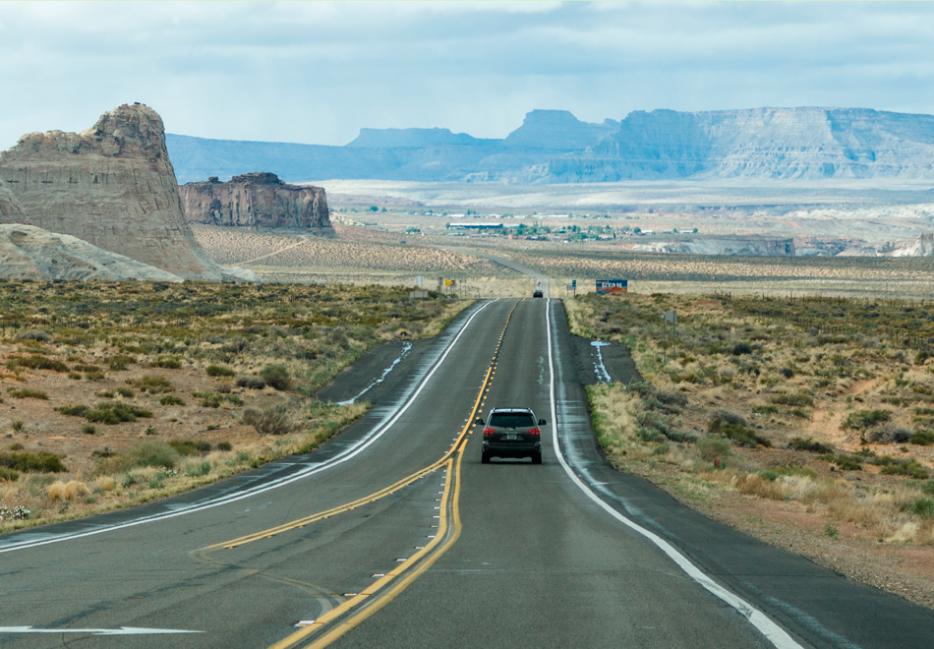First, a cliché: Man grows older. Man grows restless. Man falls out of love with his job, his home, and his city. Approaching forty, man decides to set out “into America,” whatever that means, with camera in hand. Man wants to borrow the regular folks’ aura, wants to see something real. So off he goes, 14,000-odd miles on non-interstates, the roads Rand McNally once rendered in blue. He meets dozens of people, many of whom embody a kind of edifying rustic authenticity, but others who plainly do not. Then man returns home, stirred to some kind of spiritual reckoning but still back where he started, and with even less money than before.
A book blooming in his mind, man decides that mere photos will not do, and here the cliché starts to die. Having never written a serious word before, he begins a manuscript more or less on a whim and essentially teaches himself to write over the course of its 800 pages. In the process of whittling it down, he undergoes a personal transformation so thorough that he adopts the name of an Osage ancestor, and pitches his memoir as William Least Heat-Moon. Four years after first taking the drive, man’s book is published as Blue Highways. It is a bestseller. It is reviewed by Updike himself in the New Yorker. It is immediately recognized as an essential American travelogue. And so this man, now over 40, suddenly has a new calling: professional literary voyager.
Blue Highways is the story of that first trip, the desperation-fuelled loop around the lower 48 that Heat-Moon, then known as William Trogdon, completed in the spring and summer of 1979. At the time he was a burned-out English teacher and recent recipient of a photojournalism Master’s that he’d pursued out of aimlessness. Figuring that “a man who couldn’t make things go right could at least go,” he bought a brown Econoline, christened it Ghost Dancing, and left Columbia, Mo., for the most funnily-named backwaters he could find—Nameless, Tn., Dime Box, Tx., Hat Creek, Ca.
The book’s setup isn’t the most original notion—the obvious progenitor is Travels With Charley, though reviewers were more fond of referencing On the Road, and Heat-Moon says he read Zen and the Art of Motorcycle Maintenance right before leaving—but the execution is marvelous. The pre-interstate America that Heat-Moon conveys is warm but unnerving, home to deep traditions and vast emptiness. He finds Southern monks and Southwestern hang-gliders, boat-builders, fishermen, general store owners, self-taught intellectuals, and maple syrup dynasts. It is a paean to America’s richness, but only implicitly: more than that, Blue Highways is a celebration of small-scale history. Heat-Moon is a gentle, helpful guide, always ready with the perfect archival material from the nearest library or a fearful reflection about the loneliness of the road.
This might sound strange to most writers, since we love to think of ourselves as samurai. With the slightest provocation, we will groan about the solitariness of our work, our man-vs.-nature battle with the empty page, the heroic antisocialism essential to so many writers’ self-image. “We tell ourselves stories in order to live,” we intone, reading from the Book of St. Didion. “Writers are always selling somebody out.”
But now Heat-Moon has written an account of the second journey, the one that ultimately gave purpose to his life and work. Writing Blue Highways: The Story of How a Book Happened, published this year by University of Missouri Press, is also a travel book of sorts. It took Heat-Moon four years to write Blue Highways, and the process was more self-actualizing than any road trip could possibly be. “The greatest gift of travel,” Heat-Moon writes now, “often the very point of it—is stumbling onto untutored masters.” Writing Blue Highways is a lovely little dispatch from just such a character, a guy who willed himself to literary greatness purely through desperation and psychotic perseverance.
In Blue Highways, Heat-Moon is on the road by page 3, wasting barely a couple paragraphs on the trying circumstances that sent him there. His soon-to-be ex-wife is seeing a new guy, his college decides not to renew his teaching contract, and he’s developed some vague sense of cultural unbelonging owing to his half-Native background. But he dispatches with all that in a hurry in order to get to the meat of the book: the people. Similarly, the road trip itself is merely a quick gloss in Writing Blue Highways, with personal details coming to the forefront. We are treated not only to the grunt work of composing and revising by typewriter, but to the domestic routines Heat-Moon developed as he went, the various hourly jobs he stitched together to keep afloat, and the understandable skepticism from friends, family, and neighbors.
He also doesn’t stint on the total lack of romance in his newfound obsession. “I found a weekend job on the loading dock of the Columbia Tribune from two in the morning till dawn when I’d come home,” he writes of the long, aimless middle period of his manuscript, “imprinted and scented with printer’s ink as if to remind me what I supposed to be doing… Never had I lived so poor, so incapable of escaping work.” Of a publisher rejection, the first of a few, Heat-Moon recalls, “The turndown had particular force because of the some six hundred job rejections that had driven me onto the blue highways almost four years earlier… That’s when I quit [the book] for the last time.”
Why would a man willingly subject himself to such dogged uncertainty and dashed hopes, particularly when he’d never harbored any prior literary aspirations? First, because uncertainty and hopelessness are not at all unique to the writing life, and if you’re going to be a destitute idealist, you might as well live in service to your muse. Second, to honor the sense of discovery he felt in the car and out at large. “I discovered that entering an unknown place to get adults to open their lives could be a richer pursuit than getting eighteen-year-olds to open books,” he says of his road trip. After a few years of personal and professional struggle, the trip through Podunk, USA, offered one effortless epiphany after another.
Any old mid-life failure can drive forever, but it’s another thing entirely to turn that drive into something cohesive, meaningful, and entertaining. That’s almost an act of transubstantiation.
And third: for the company. This might sound strange to most writers, since we love to think of ourselves as samurai. With the slightest provocation, we will groan about the solitariness of our work, our man-vs.-nature battle with the empty page, the heroic antisocialism essential to so many writers’ self-image. “We tell ourselves stories in order to live,” we intone, reading from the Book of St. Didion. “Writers are always selling somebody out.” But Writing Blue Highways gives the lie to this idea. Relative to the road or Heat-Moon’s pre-drive personal low, the period of Blue Highways’ composition was an extended stay at summer camp. He meets a woman in his apartment building, known here only as “Lucy,” who provides a ballast as he floats along in this new dream. She listens to his complaints and self-dismissals, celebrates his minor triumphs, and, though he doesn’t quite put it this way, supplies him with an immediate, visible audience that holds him accountable for finishing his work. Never mind that Lucy never reads the manuscript; she expects him to complete it, and to make good on all his bluster. All but the most unlucky or self-motivated writers have someone like this, some friend or loved one to witness and validate the struggle.
Heat-Moon accrues more purely occupational debts as well: there’s a particularly well-read fellow English professor whose unimpressed first response to the manuscript sent the author scuttling back to work with renewed focus; he describes the editor at Atlantic Books who finally showed interest in Blue Highways and, in so doing, redeemed four potentially wasted years of Heat-Moon’s life. These are life-changing relationships, people he entrusted with the most personal and heartfelt work he’d ever done. If you’ve ever published anything, you know the gratitude he’s talking about. It is the furthest thing from lonely.
In Blue Highways, Heat-Moon says he left Columbia “with a nearly desperate sense of isolation and a growing suspicion that I lived in an alien land,” while the road itself, for all its pockets of conversation, provided endless hours for further solitary reflection. Writing Blue Highways, on the other hand, is a story of purposeful labor and deepening friendships. It ends with a book launch party where Heat-Moon is given a plaque, engraved only with the single word “PUBLISHED.” For a certain kind of person, that one past-tense verb is the greatest possible source of accomplishment and personal validity. This is a book about writing, but it’s also the story of one man’s decision to become this kind of person. Any old mid-life failure can drive forever, but it’s another thing entirely to turn that drive into something cohesive, meaningful, and entertaining. That’s almost an act of transubstantiation. “Rewriting is redemption,” Heat-Moon says. He’s talking about editing, but not only.






